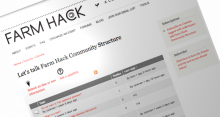Food Solutions New England (FSNE) is a regional food systems learning-action network dedicated to advancing a sustainable New England food system. The FSNE network is organized around four interrelated activities:
A New England Food Vision, a bold vision that calls for our region to build the capacity to produce up to 70% of food that is produced in an environmentally and socially sustainable manner, that promotes health and is accessible by all New Englanders by 2060; New England state food planning initiatives; annual New England food summits and topical workshops; and related analysis, communication and visualization.
The UNH Sustainability Institute serves as the backbone organization for FSNE. Since its inception in 2006, FSNE has advanced its mission by linking a common agenda, shared measurement, continuous communication, and synergestic activities.




Looks like RTK is also mentioned to add precision (http://en.wikipedia.org/wiki/Real_Time_Kinematic)
but I think there are many potential applications with lesser precision requirements - like basic record keeping, and assuring a good spread pattern or when no-tilling or tedding, or tine weeding when it is hard to see where you have been previously(some times) and a little overlap is OK, and manual correction is still possible. The precision for total automation seeding is also different then holding a heading when a manual backup and correction is possible. A fairly rough system would still enable more attention to be dedicated to cultivator or transplant adjustment etc. Fun discussion to add to the electric allis G, farmbot, and the weeder platforms etc...